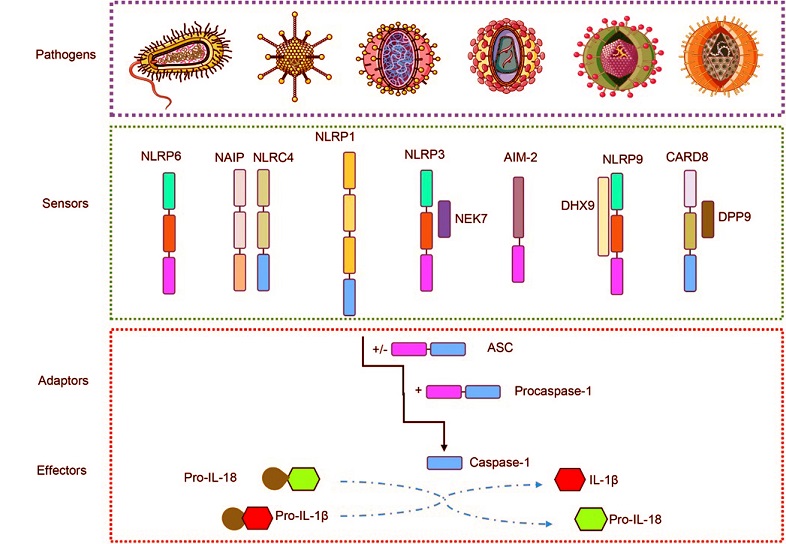Nikhil Prasad Fact checked by:Thailand Medical News Team Jan 22, 2025 11 months, 4 weeks, 2 days, 11 hours, 17 minutes ago
Medical News: Inflammasomes are specialized protein complexes within our cells that play a critical role in defending against infections. Inflammasomes are key to how our immune systems recognize and respond to harmful pathogens. These cellular structures detect patterns associated with pathogens or damaged cells, triggering a cascade of immune responses.
 Inflammasomes and Their Role in Microbial Infections
Inflammasomes and Their Role in Microbial Infections
Overview of inflammasome family members. Kinds of pathogens produce prime and activation signals to induce inflammasome sensors activation, which then recruit adaptors and effectors together assembly into inflammsome. Activated inflammasome produce active effectors to cleave pro-cytokines into mature form and initiate inflammation
Inflammasomes are not only crucial for fighting off infections but also for maintaining a balanced immune response. Overactivation can result in excessive inflammation, leading to diseases. Scientists from institutions such as the University of Science and Technology of China (USTC), Lishui University, and others have recently delved deep into how pathogens interact with and evade these cellular defenses. This
Medical News report details their findings and discusses potential treatments that target inflammasome mechanisms.
How Inflammasomes Work
Inflammasomes are composed of three main components: a sensor receptor protein, an adaptor protein called ASC, and a molecule known as procaspase-1. When a pathogen invades, it releases signals that activate the inflammasome. This leads to the conversion of procaspase-1 into an active form, caspase-1, which, in turn, triggers inflammation and the release of cytokines like IL-1β and IL-18.
Different types of inflammasomes, such as NLRP3, AIM2, and pyrin, respond to distinct triggers. For example, the NLRP3 inflammasome reacts to stress signals like changes in cellular potassium levels, while AIM2 detects DNA from viruses or bacteria.
Pathogens and Inflammasome Activation
Pathogens, including viruses and bacteria, can activate inflammasomes to a varying degree. Studies have shown that influenza, hepatitis C, Zika virus, and bacteria like Staphylococcus aureus and Escherichia coli stimulate inflammasome activity. However, instead of recognizing pathogens directly, inflammasomes often respond to changes in the cellular environment caused by infections. For example, the NLRP3 inflammasome senses alterations like increased calcium ions, reactive oxygen species, or mitochondrial damage.
Evasion Tactics by Pathogens
Despite the immune system's best efforts, many pathogens have evolved to escape detection. Some viruses, such as HIV-1 and SARS-CoV-2, deploy strategies that inhibit inflammasome activation. For instance, SARS-CoV-2 proteins NSP1 and NSP13 prevent the assembly of inflammasomes, while influenza virus proteins reduce the activation of caspase-1.
Similarly, bacterial pathogens like Salmonella produce proteins that disrupt inflammasome a
ssembly. These evasion mechanisms allow pathogens to persist in the body, leading to chronic infections.
Key Study Findings
The study findings provide a comprehensive overview of how pathogens interact with inflammasomes. Key findings include:
-The NLRP3 inflammasome is particularly reactive to bacterial toxins and viral proteins. Activation often relies on cellular changes like potassium ion loss or mitochondrial stress.
-Viruses like Zika and influenza use specific proteins to prevent inflammasome assembly, thereby avoiding detection.
-Bacteria employ a variety of methods, such as degrading inflammasome components or suppressing essential signaling pathways, to evade immune responses.
-Novel therapeutic approaches are being developed to counteract these evasion tactics, including drugs targeting inflammasome activation pathways.
Potential Therapeutic Strategies
Researchers have proposed targeting inflammasomes as a way to combat infections and associated diseases. Drugs like MCC950, which inhibits the NLRP3 inflammasome, have shown promise in reducing inflammation. Other compounds, such as JC 124 and CY-09, work by blocking key steps in inflammasome activation.
In addition to inhibitors, some therapies aim to enhance inflammasome activity to combat immune-evasive pathogens. Early studies suggest that certain molecules can amplify immune responses, helping the body to eliminate infections more effectively.
Conclusion
This research underscores the importance of inflammasomes in our immune defense system. While they are essential for combating infections, their overactivation can lead to harmful inflammation. Targeted therapies that modulate inflammasome activity could pave the way for effective treatments for infectious diseases. The findings also highlight the intricate battle between pathogens and the immune system, showcasing the sophisticated mechanisms both use to outmaneuver each other.
The study findings were published in the peer-reviewed journal: Cellular and Molecular Life Sciences.
https://link.springer.com/article/10.1007/s00018-025-05575-2
For the latest in Immunology, keep on logging to Thailand
Medical News.
Read Also:
https://www.thailandmedical.news/news/neuroinflammation-and-new-strategies-for-brain-health
https://www.thailandmedical.news/news/aging-and-the-role-of-mitochondrial-stress-in-neurodegeneration
https://www.thailandmedical.news/news/sars-cov-2-proteins-linked-to-brain-inflammation-and-neurodegeneration
